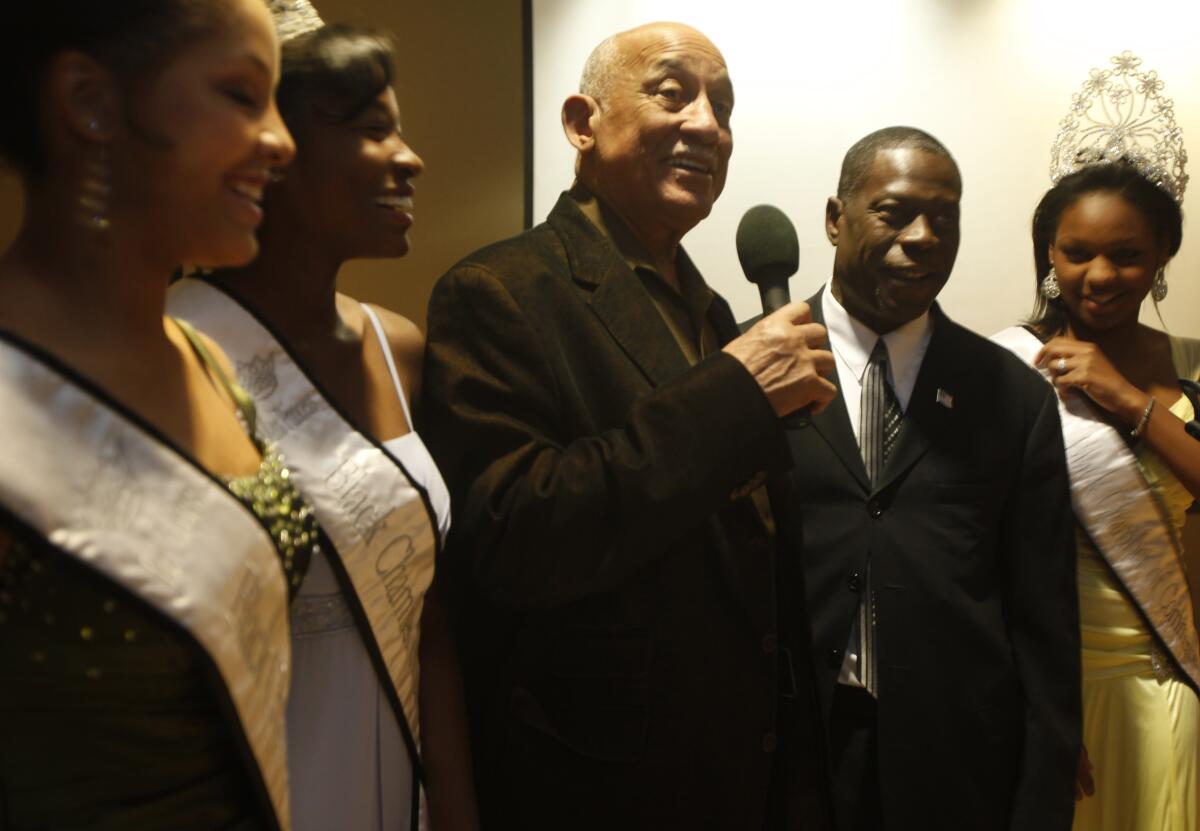Darren Parker, California activist who lifted the voices of African Americans, dies at 59

- Share via
Darren W. Parker, a political activist who fought for racial equality as chairman of the California Democratic Party’s African American Caucus and former president of the local National Assn. for the Advancement of Colored People, has died at his home in Lancaster.
Parker died July 22 from esophageal cancer, said his wife, Brenda. He was 59.
“[Parker] was a good man. He loved God; he loved his family; he loved his friends; and he loved his people, especially the California Democratic Party African American Caucus,” the organization said on its website. “He will be truly missed.”
A longtime local and political activist, Parker was deeply embedded in local and state issues for years. He led the African American Caucus for more than a decade, was president of the Antelope Valley Democratic Club and vice chairman of the Los Angeles County Democratic Party. He also worked for Assembly speakers John Peréz, Toni Atkins and Anthony Rendon in the state capital and was a member of numerous community groups such as the Antelope Valley Partners for Health, the YouthBuild Advisory Board and the Los Angeles County Commission for Children and Families.
He also worked as a cable maintenance splicer for Pacific Bell, a job he held for more than 20 years, and an international staff representative for the Communication Workers of America, which represents telephone company employees.
Parker was born Jan. 26, 1960, and raised in Compton, but lived in the Antelope Valley for much of his adult life.
Brenda and Parker met in the early 1980s at a park in Gardena. The 17-year-old was playing tennis when Parker approached her and asked if he could play, she recalled. They were married in the summer of 1983.
Parker’s political engagement began when he was 11, he told the Los Angeles Sentinel in 2017 when he announced his Stage 3 cancer diagnosis. After joining forces with his brother and three cousins, they founded the One Hundred Thousand Students for the Freedom of South Africa at his grandmother’s house in Compton.
“Very early in life, we were creating organizations in the backyard and had meetings about how do we help the students over there that we can’t see and can’t touch, but yet, want to be a part of stopping the struggle that they’re in,” he told the paper.
He attended El Camino College and Cal State Northridge, and earned a bachelor’s degree from UCLA.
In 2011, Parker ran in a special election for the state Senate against the better-known Sharon Runner in a district that stretched from Ventura to San Bernardino County and regularly voted Republican. He lost, as he did in his 2016 campaign for an Assembly seat.
Taisha Brown, interim chair of the African American Caucus, said Parker was always “really enthusiastic about what he believed in.” He “made sure that our people know that our ancestors fought for our right to vote, and that they knew he was there to fight for our rights. That democracy is for everyone.”
She called him a relentless fighter who “never gave up.” Even in his last months, as sick as he was, Parker attended a convention in San Francisco and “gave it his all.”
But Parker was not without flaws. In January, former state Senate candidate Johnathon Ervin filed a complaint against Parker for using a racial slur in referring to him. In response, Parker apologized in a statement offering “some context,” saying that the “n-word is a common part of the African American lexicon due to no fault” of their own and that the two men had known each other for years.
“As a longtime community and party leader, I hold myself to a higher standard,” he said.
An outpouring of condolences from politicians and dignitaries followed after news of his death.
City Councilman Herb Wesson tweeted that Parker “was a true public servant whose name will forever be synonymous [with] what it means to lead with passion, conviction, & persistence.”
Rusty Hicks, chairman of the California Democratic Party, remembered Parker as a “dogged advocate for what he believed in.”
“His language was often colorful, his tactics were sometimes questioned, but his commitment never was.”
Parker is survived by his wife; mother Kai; daughters Jasmine, Britney, Tiffany, Amber and Trinity; and several grandchildren.
More to Read
Start your day right
Sign up for Essential California for the L.A. Times biggest news, features and recommendations in your inbox six days a week.
You may occasionally receive promotional content from the Los Angeles Times.







